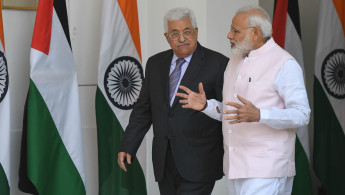India's Modi to meet Palestinian leader during Mideast tour
Indian Prime Minister Narendra Modi will meet the Palestinian leader during a brief tour of the Middle East, the foreign ministry said Monday, just weeks after hosting Israel's Binyamin Netanyahu.
The Indian premier will visit Ramallah first on his three-day tour of the region between February 9 and 12, which will also take in Oman and the United Arab Emirates.
Modi will hold talks with Mahmoud Abbas in an overture seen as India's effort to balance its decades-old support for the occupied territories against its growing closeness to Israel.
| Read also: India must not forget its historic support for Palestine |
Foreign ministry official B. Bala Bhaskar said Modi's visit would be his first, though the Indian premier has met Abbas on three previous occasions.
The leaders are expected to discuss information technology, health and tourism during the brief visit, Bhaskar added. Modi will also address a joint press conference and attend a banquet.
New Delhi says it has long backed the Palestinian territories' quest for nationhood and Modi has articulated support for an independent state existing peacefully alongside Israel.
Bhaskar said India's refusal in December to support US moves to recognise Jerusalem as Israel's capital was consistent with its unwavering support.
Ahead of the first visit by an Israeli leader to India in 15 years, Netanyahu said he was "disappointed" by India's decision.
But any tension appeared forgotten as the two leaders embraced in New Delhi last month and heralded a "new era" between Israel and India as deals were signed on cybersecurity and energy.
| Read also: Netanyahu's war crimes come to light as #ShalomBollywood selfie backfires |
Modi became the first Indian leader in history to visit Israel in July 2017.
He will depart for the UAE on Saturday, where he will address a summit in Dubai and meet business leaders before travelling to Oman for further engagements.
The Gulf is a critical region for New Delhi. India sources more than half its oil and energy supplies from the region, and around nine million Indians live and work there, sending home billions of dollars in remittances annually.





 Follow the Middle East's top stories in English at The New Arab on Google News
Follow the Middle East's top stories in English at The New Arab on Google News
![Netanyahu furiously denounced the ICC [Getty]](/sites/default/files/styles/image_330x185/public/2024-11/GettyImages-2169352575.jpg?h=199d8c1f&itok=-vRiruf5)
![Both Hamas and the Palestinian Authority welcomed the ICC arrest warrants [Getty]](/sites/default/files/styles/image_330x185/public/2024-11/GettyImages-2178351173.jpg?h=199d8c1f&itok=TV858iVg)
